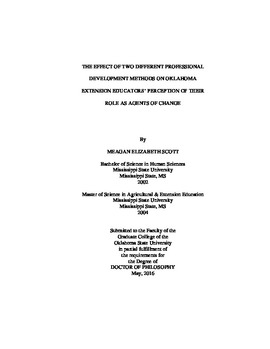| dc.contributor.advisor | Weeks, William Gerard | |
| dc.contributor.author | Scott, Meagan Elizabeth | |
| dc.date.accessioned | 2017-02-22T22:10:29Z | |
| dc.date.available | 2017-02-22T22:10:29Z | |
| dc.date.issued | 2016-05 | |
| dc.identifier.uri | https://hdl.handle.net/11244/48865 | |
| dc.description.abstract | The purpose of this study was to investigate the influence of two professional development delivery methods, a workshop and a computer simulation activity, on how Extension educators see themselves as change agents and the possibility of moving Extension educators from reactive to proactive programming. To assess the effectiveness of the professional development delivery methods, the study explored Extension educators' perceptions of Extension educator roles and work responsibilities. All Oklahoma Cooperative Extension Service county Extension educators (N = 178) employed as of January 14, 2016, comprised the target population for this study. The study utilized an experimental pre-post-post-test two-group comparison design. The instrument consisted of ranking nine Extension educator roles in order of importance, and rating 12 work related responsibilities on a 6-point Likert-type scale in terms of what is the best use of an Extension educator's time. Data collection was conducted during the 2016 Oklahoma Cooperative Extension Service biennial conference. All county Extension educators in attendance were invited to participate in a two-part professional development session titled Making an Impact as a Change Agent. Rogers' (2003) Diffusion of Innovations Theory served as the basis for the content for the session because of its agricultural roots and its applicability to the mission of the Cooperative Extension Service. Of the Extension educators participating in the session, 77 fully completed all three instrument administrations (Pre-Test, Post-Test I, Post-Test II). Participants perceived Teach Problem Solving Skills as the most important role and Access Resources of Total University as the least important role. Both findings are consistent with Smalley's (1985) study of the perceptions of Minnesota Extension educators. The treatment administered during the two-part professional development session caused participants to perceive all 12 of the work responsibilities as a better use of an Extension educator's time. | |
| dc.format | application/pdf | |
| dc.language | en_US | |
| dc.rights | Copyright is held by the author who has granted the Oklahoma State University Library the non-exclusive right to share this material in its institutional repository. Contact Digital Library Services at lib-dls@okstate.edu or 405-744-9161 for the permission policy on the use, reproduction or distribution of this material. | |
| dc.title | Effect of two different professional development methods on Oklahoma extension educators' perception of their role as agents of change | |
| dc.contributor.committeeMember | Weeks, Penny Pennington | |
| dc.contributor.committeeMember | Baker, Marshall A. | |
| dc.contributor.committeeMember | Davis, Robert Evan | |
| osu.filename | Scott_okstate_0664D_14574.pdf | |
| osu.accesstype | Open Access | |
| dc.type.genre | Dissertation | |
| dc.type.material | Text | |
| thesis.degree.discipline | Agricultural Education | |
| thesis.degree.grantor | Oklahoma State University | |
